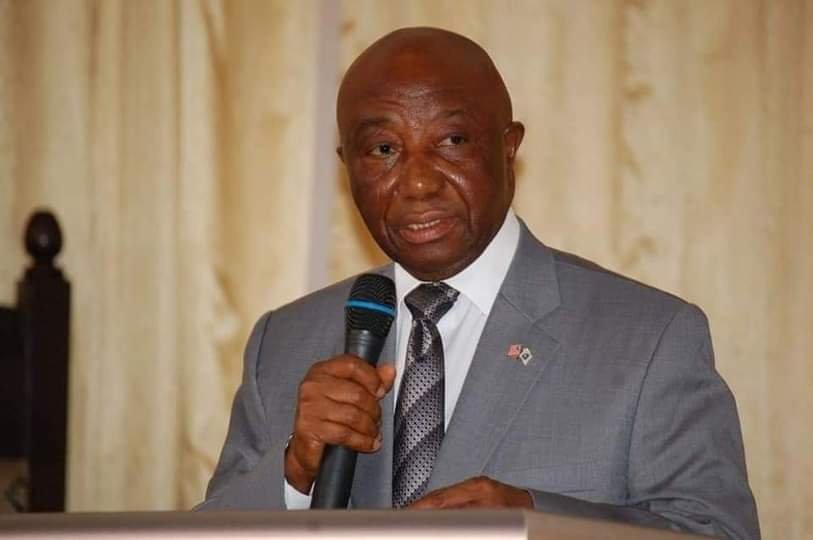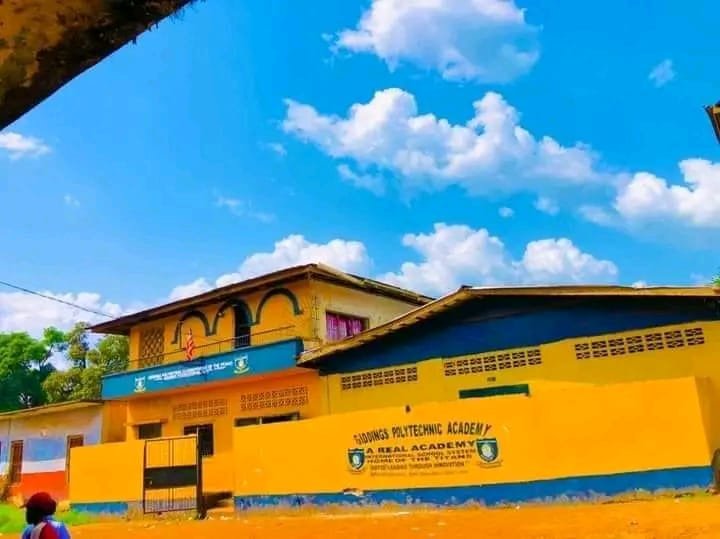
Date: March 12, 2021.
Dr. Herman Browne, President;
The Chairman and Members of the Board of Trustees;
Administrators, Staff, and Faculty;
Student Body;
Parents, Guardians, and Well-wishers;
Distinguished Ladies and Gentlemen
I am honored and indeed pleased to have been selected to perform the pleasant task of being the Guest Speaker on the occasion of the 59th commencement convocation of this 2021 graduating class on this historic and beautiful campus here in Suakoko.
We have therefore come to this sacred hall today to celebrate the reward of four years of your hard work. Many have passed through this hall before you and many more will pass after you.
My task is made much easier because I am always delighted to speak to young people such as these graduates, who are poised to become future leaders in the development of our country. I always remind those who are graduating that their COMMENCEMENT means the beginning, but NOT the end of their academic sojourn. Commencement convocation should therefore be seen as the BEGINNING of their entrance into adulthood and the long and even odorous journey of life.
At this junction on a young person’s mind, on a day like today, there are mixed emotions, joy and fear! The joy that after four long years, for some even more than four years, you are being rewarded with a degree and given the pass to go into the world and start a career.
The fear of uncertainty, whether you will get a good and well-paying job that will allow you to build a career. I know that feeling, I too walked a similar path many, many years ago. “I will not say how many years ago because I will give my age away”.
I walked this path, both literally and figuratively, because I passed by Cuttington when I walked from Foyah to Monrovia to attend high school. Also, one day I too sat in the sacred hall at the University of Liberia and earn my first degree with mixed emotions. So I understand and know what you are going through.
So far, your parents have guarded you in this segment of the academic sojourn you have completed. While your parents and guardians will still be around in a supportive role, the main task of your growth and development from now on will be your responsibility, making the necessary decisions and adjustments as you face the future.
I want to take the time now to thank your parents, guardians, and well-wishers for the support they have given you to reach this point of your sojourn. Parents, to you I say, I understand your emotions today also. I have stood by and guarded my children as they too pursued and gained a higher education. Like your children, today is a day of mixed emotions. You are happy they have completed this chapter and now you are concerned about what life holds for them career wise. I understand your uncertainty. But believe me, they will persevere!
It is also appropriate to thank President Browne, the trustees, administrators, faculty, and staff of this great University for the role they have played over the years to develop and mold you as Graduates.
I also want to appreciate the Cuttington University family, especially students on the Debate team led by Beulah Nimene, for winning the 2019 Inter Universities and Colleges Debate organized by NAYMOTE Partners for Democratic Development in collaboration with the Ministry of Internal Affairs (MIA) in competition among eight universities and colleges across the country under the theme: “Youth Perspectives on the LGA 2018.”
Indeed, this University, founded in 1889, as the Cuttington Collegiate and Divinity School in Cape Palmas, Maryland County, has carved a historical and enviable role for over a century as one of the two prestigious institutions of higher learning in Liberia. When it was moved in 1949 to its present campus in Suakoko, it continued and even improved its academic standing, becoming Cuttington University College, by upgrading its facilities, adding new courses and disciplines to become a premier institution of higher learning. Today, Cuttington University, a faith-based higher education institution, can rightly boast of having its graduates not only as leaders in various aspects of development in Liberia but all over West Africa.
As I congratulate you the graduating class of 2021, you must take much pride in your alma mater as you are now joining an illustrious list of alumnae. I have no doubt that you have been adequately prepared by Cuttington University to embark on the rest of your academic sojourn and life’s journey.
HOWEVER, my concern is about the state of higher education in Liberia today. I believe that higher education is becoming an endangered species because of the lack of adequate financing.
Allow me therefore to address this auspicious occasion on the topic: GOVERNANCE AND RELEVANCE OF HIGHER EDUCATION IN LIBERIA: CHALLENGES AND OPPORTUNITIES.
HIGHER EDUCATION IN LIBERIA
Before the advent of our civil war in 1989, Liberia had a total of 5 institutions of higher learning, but since 2003 when peace was finally restored, the number of higher education institutions has increased to 32, comprising of 3 Universities, 4 University Colleges, 1 Polytechnic, 8 Seminaries, and 16 Junior or Community colleges.
As one looks at the above statistics, it is clear that the number of institutions of higher education has more than double. What is of concern to me about this growth remains the fact that most of these tertiary education institutions are structured in haste, inadequately financed, and are not clearly aligned with our national development agenda.
GOVERNANCE
Over the years, development documents have been crafted into education plans and policies to improve educational governance and management.
However, in the past three years, this Government has been noted for poor governance, especially politically and economically. This overall poor governance is affecting the governance of the nation’s education sector, including Higher Education.
The general patterns being observed are that poor governance and mismanagement of meager resources available to the education sector have been fueled by the lack of proper accountability bordering on corruption.
Under this Government, and in view of continuity in governance, I am not sure that the shift has been made from quick impact interventions to sustained, strategic, and long-term sector development in higher education.
When you place such patterns juxtaposed to the present coronavirus pandemic and economic downturn, the under investment in education becomes even more pronounced. Yet, education is one of the most visible tangibles any government can use to demonstrate its capacity to serve all its citizens.
It is therefore imperative that this Government muster the willingness to promote good governance in administering the meager resources of the education sector.
RELEVANCE
The factor of relevance is a fragility that could directly affect you as Graduates. It has economic, social, and civic characteristics. Relevance in education is paramount for you as Graduates, as schooling is supposed to make you productive citizens.
In other words, economically, the education you have gotten should have marketplace value or relevance, opening up opportunities for each of you; socially, it should prepare you to participate fully in community and political responsibilities; and civic relevance should give you positive attitudes towards your nation, including good citizenship, national pride and patriotism, and knowledge of the world in this age of globalization.
This forms part of the fear and uncertainty some if not all of you are feeling today. Perhaps you are asking yourself: will my skill set be used in the workplace? Will I be gainfully employed? How long will it take before I get a job? Will I be able to use my skill set to build a career? When I sat where you are now, Liberia was different back then, but I experienced this same emotion many years ago when I too graduated from college. I can relate. However, I persevere over the years by staying true to myself and holding myself to a high standard of integrity.
I would therefore like to suggest to this Government that it should embrace education relevance as important to the creation of a better livelihood for uplifting the standard of living of our people. In short, education relevance provides economic benefits to students and their families, thereby also prospering the nation.
CHALLENGES
The challenges facing higher education in Liberia are numerous, such as the lack of modern facilities, ill-equipped classrooms and labs, insufficient qualified and well-paid faculty, efficient staff, and poor financing. All of these are necessary for providing a better teaching and learning environment. Of these, I would like to focus on the FINANCING of these institutions as the most important challenge.
I believe that if these institutions can survive and contribute to nation building now and in the future. I therefore challenge all stakeholders of higher education, including college administrators, domestic and foreign donors, families of students, and the national government, to be fully engaged in finding the necessary funds for their sustainability.
Government’s increased financial support is especially needed. Poor financing or lack of financing by both the legislative and executive branches of government is lowering the standards of good governance and educational relevance which provided quality higher education in the past – once the hallmark of the University of Liberia and Cuttington University.
Given the economic and political conditions of the country, government must prioritize the financing of higher education in order to target human capacity building with the national development agenda in the quest of attracting investment. Investors are not going to come to a country with their money when there is not a sufficiently skilled workforce or a sustainable labor market.
For example, one comparative study of the labor market and college graduates from the University of Liberia and Cuttington University noted the importance of such an alignment. The graduates said they were not satisfied with their employment situation, noting that they wished their respective universities would have improved on the skills they are developing in students for better alignment between college education and the workplace. Based on the study, it was found out that most graduates interviewed felt that they are either wrongly employed (if they found employment at all) or their worlds of work are not career oriented.
I suggest therefore that this Government takes the necessary steps to strengthen the link between higher education and the labor market by associating government financing of higher education with its agenda for national development.
OPPORTUNITIES
Opportunities at institutions of higher education are plentiful, but they are hardly tapped into as means of providing quality education at this level, mostly because of poor financing. Institutions of higher education in Liberia, in the past, have hinged their funding or financing on the Government and foreign philanthropists or donors, beginning with the University of Liberia in 1862 and Cuttington University in 1889.
This dependency syndrome has meant that over the years, college administrators and the government officials have not been thinking OUTSIDE THE BOX for other means of funding higher education.
For example, as a public institution of higher learning, the University of Liberia has relied solely on the Government of Liberia for its funding, and this public financing continues to dwindle over the years during each annual national budget exercise. Cuttington University, as a faith-based institution, has remained the only higher education institution that continues to receive government’s subsidy. That subsidy, however, is being reduced yearly. In this 2020-2021 national budget, its subsidy has reached the lowest – US$300,000 as compared to its highest 2017-2018 approved subsidy of US$579,634.
However, some credit should be given to the present administrators at the University of Liberia. Recently, in defending its proposed 2020-2021 draft budget of US$26.3 million to the Legislature, it justified the budget as needed for the smooth running of the university and for investment in additional revenue generation streams. The UL administrators were clearly thinking outside the box when they identified several projects, including investment in an insurance company, printing press, and water bottling company, under public-private partnership arrangements.
As the UL president noted, “Funds from these investments will reduce the university’s dependence on the government for almost everything.” Well, our legislators or lawmakers responded by reducing the university’s draft budget projection for 2020-2021 to US$13.9 million instead.
Perhaps, one cannot blame our legislators because the piece of the pie given to the education sector in general has reduced drastically. In fact, Liberia’s funding of education is the lowest among countries in the sub-region. The national government’s contribution will remain low because the allocation of this meager resource in the budget is being scattered thinly. For example, there are nine (9) county community colleges being funded within the 2020-2021 budget projection of US$6,267,557, even though there have been some unaccountability problems.
I am afraid that government will continue to increase funds to these institutions and may even allocate additional funding to build county community colleges in the rest of the six (6) counties that do not have community colleges because of political interests or consideration. Take, for example, comparison of funds projected for the Bong County Technical College (BCTC) and Cuttington University’s subsidy projected for the 2021-2022 national budget: US$943,332 and US$392,148 respectively.
The comparison and contrast is that funding for BCTC is INCREASING from its 2017-2018 budget of US$916,352, while Cuttington’s subsidy is DECREASING from its 2017-2018 budget of US$579,634. I believe that this trend is an indication that this Government is getting away from subsidizing or financing faith-based institutions like Cuttington.
So, the picture is clear. Cuttington trustees and administrators should therefore begin to think outside the box for future funding, using the university’s strengths. For example, besides the subsidies, this university could propose public-private partnerships with Government to train more Liberian teachers (in its two-year teacher training course) and to also train future farmers (in its three-year industrial training course in agriculture and crafts). In addition, these proposals could also be brought to the attention of our international development partners for their support.
Therefore, I would like to encourage President Browne and the board of trustees to increase their efforts at soliciting non-government funding, such as direct contact with external donors, well-to-do alumnae, and fundraising activities. I need not tell you, President Browne, that there are a lot of money around to fund programs in Education and Agriculture.
Another opportunity that has not been tapped as a source of funding by higher education institutions in Liberia is the area of research. Developing a research emphasis at our institutions of higher learning will both impact the implementation of our national development programs and contribute to the global knowledge economy. Funding from research has proven to be a sustainable source of funding for higher education. Most importantly, it can be said that research is a direct relationship between education, employment, and development in those countries we consider developed and advanced.
I conclude my remarks by noting that those of us who are considered as the so-called ‘Opposition’ are often accused of discussing the problems in our society, but not known for providing solutions to them.
Therefore, I want to provide one solution for identifying opportunities and solving most of the challenges faced by higher education in Liberia today.
I wish to recommend to our Government that it should establish a Ministry of Higher Education, Technical and Vocational Training.
Such a Ministry could gather under one umbrella the diverse entities and programs scattered around the country dealing with separate and uncoordinated aspects of higher education and TVET in Liberia.
Finally, let me assured you I have walked in your shoes. Once again, let me say CONGRATULATIONS as you celebrate your reward for a job well done. Stay focus, keep your eyes on the prize, treat your experiences in life like a marathon (you are in it for the long haul); when it gets cloudy sometimes and you feel like quitting, remember my life story: A boy who walked from Wasonga in Foyah District to Monrovia; graduated from the College of West Africa and the University of Liberia; without being boastful, went on to become Vice President of Liberia; and, in 2023, will be vying for the Presidency of our beloved country.
As you leave this sacred hall today, I wish you all success in your future endeavors, and call on you to THINK LIBERIA, LOVE LIBERIA, and BUILD LIBERIA!
Thank you.



 A Call for Strategic Engagement: The Importance of U.S.-Liberia Relations in Development and Global Stability:
A Call for Strategic Engagement: The Importance of U.S.-Liberia Relations in Development and Global Stability:  Young Woman’s Mysterious Death Sparks Ongoing Police Investigation in Foya, Lofa County
Young Woman’s Mysterious Death Sparks Ongoing Police Investigation in Foya, Lofa County  MISSING CHILD IN LOFA COUNTY SPARKS PUBLIC OUTRAGE AND INTENSIFIES SECURITY RESPONSE
MISSING CHILD IN LOFA COUNTY SPARKS PUBLIC OUTRAGE AND INTENSIFIES SECURITY RESPONSE  Liberia National Police Urges Peaceful Protesters to Seek Permit for Solidarity March with Burkina Faso’s President Traore
Liberia National Police Urges Peaceful Protesters to Seek Permit for Solidarity March with Burkina Faso’s President Traore 


